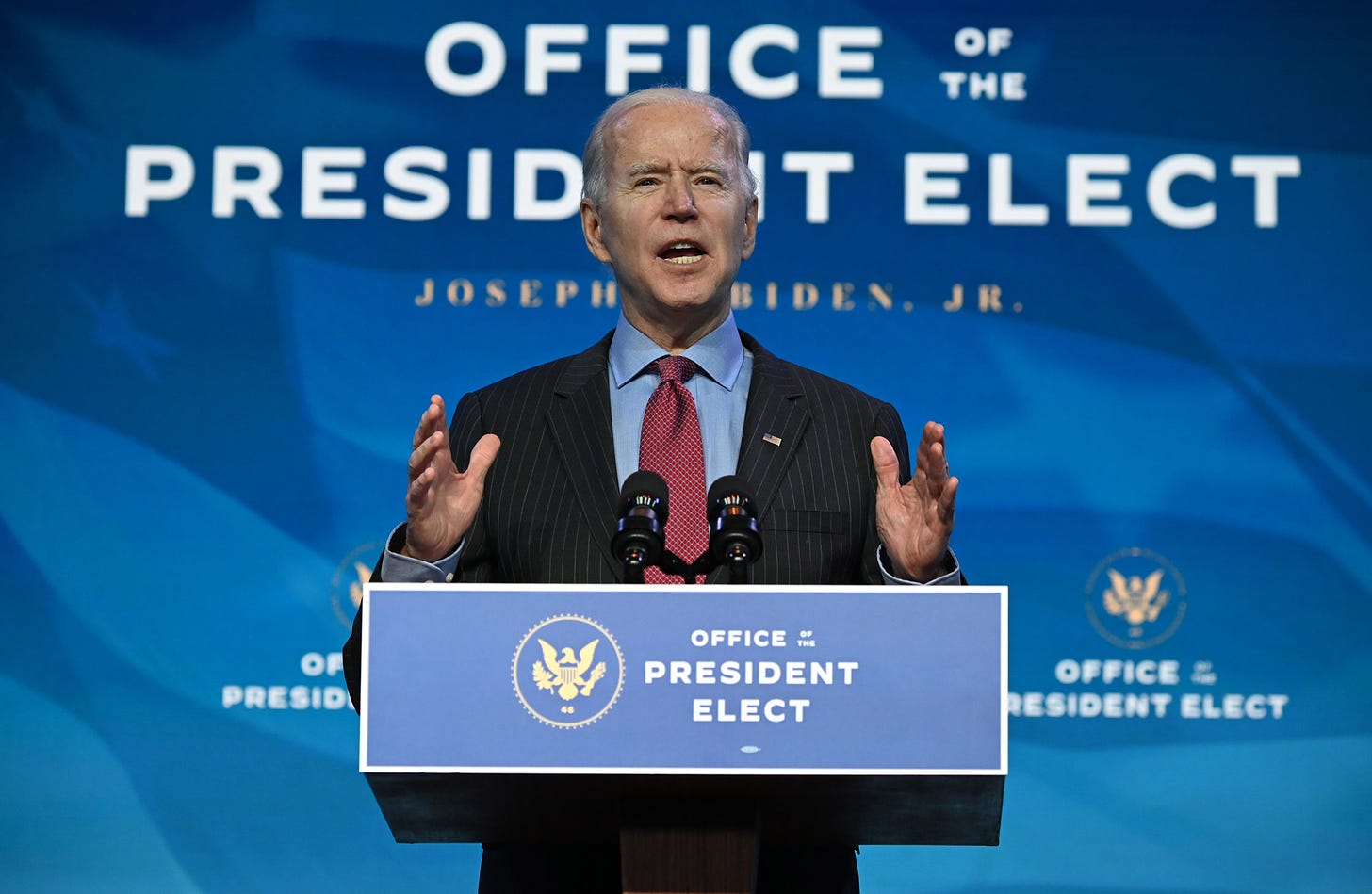Joe Biden’s—and America’s—Precious Opportunity
For his policy agenda to go anywhere, he must find the economic and social sweet spot to hold together his coalition.

Despite the viciousness of our morally deformed president and his seditious followers, last week a sobered Congress confirmed Joe Biden’s Electoral College victory. At this fraught moment, much of our national attention is consumed by the mob attack on the Capitol—the question of how to hold Donald Trump and his enablers accountable; the fears of continuing unrest and intensifying disunity. But out of sheer necessity, the president-elect has focused on assembling his administration and planning its policy agenda—and, thereby, opening a path to sanity and renewal.
Although—or perhaps because—Trump’s ruinous presidency culminated in this terrible passage, Biden may have a precious opportunity to restore our sense of purpose and possibility. But his skillful navigation of the electoral map should not be confused with an untrammeled legislative mandate. In many jurisdictions he proved more popular than his party; by steering a center-left course, he outpolled a loathsome opponent shunned by critical constituencies. The residue is excruciatingly narrow majorities in the House and Senate, and losses in critical state legislatures which will redraw the congressional map to succor the GOP.
In outperforming his party, Biden attracted suburbanites—including some ticket-splitting Republicans—while losing ground with blue-collar voters and, around the margins, minorities who are critical to the party’s success. There is little evidence that progressive messages like “defund the police” or “decriminalize the border” resonate in swing states or districts—far from it.
In the Georgia runoffs that cost Republicans control of the Senate, Democrats turned out a coalition of African Americans and whites who responded to a mainstream message rooted in combating COVID and providing economic opportunity. Here, too, Trump helped—by complaining that Georgia’s presidential election was rigged, he suppressed the GOP’s vote.
Overall, the Democrats’ hard-won victories underscored their internal tensions and contradictions. However ardent and important, progressives are not a majority within the party; the belief that demographic change will overrun Republicans is belied in the near term by an Electoral College map which, combined with gerrymandering, means that Democrats need moderate voters to succeed. Inevitably, this promotes a less ideological agenda than progressives desire.
Moreover, the bulk of minority voters—blacks, Hispanics, and Asian Americans—are not ardent economic progressives. The blue-collar voters Democrats need to reclaim may respond to a progressive economic message but, quite often, resist the social liberalism congenial to both progressives and moderate suburbanites. To keep the party together, Biden must find the economic and social sweet spot which gives this uneasy amalgam reason to cohere—and, more than that, a hope for the future shared by enough of the electorate to renew our common future.
This requires Democratic voters and officeholders to recognize the arduous legislative terrain. The narrow margins in Congress require virtual unanimity among the party’s senators and representatives. More vexing, the Senate’s filibuster rule requires a 60-vote majority for many legislative proposals; abolishing the filibuster would require the vote of all 50 Democratic senators—and at least one, Joe Manchin, won’t support it. For many legislative proposals considerable power may reside with Manchin and fellow Democratic moderates like Kyrsten Sinema and Mark Kelly, perhaps joined by persuadable Republicans like Susan Collins, Lisa Murkowski, and Mitt Romney.
In this environment, Biden’s call for bipartisan cooperation combines politesse and practicality. But he well understands that Republican legislators represent an ardent base whose majority believes that he stole the election, and expects them to respond with scorched–earth opposition. A Senate studded with presidential aspirants whose ambitions swallow their integrity—Ted Cruz and Josh Hawley leap to mind—will further salt the ground for meaningful compromises which preserve the Democrats’ own legislative integrity. Biden has real power now, and must use it.
Biden also has debts to pay, and so does his country. Chief among them is to African Americans who, more than any other constituency, made him the Democratic nominee and now the president-elect. For too long they have awaited systemic change to redress the toxic heritage of injustice: endemic economic inequality; discriminatory and often brutal law enforcement; substandard healthcare and housing; and voter suppression. At the least Biden must seek a $15 an hour minimum wage; non-discrimination in federal contracting; reformed policing practices; access to affordable healthcare, housing, and environmental safety; relief from voter suppression; and ease of voter access.
But Biden’s first imperative is his best chance to be the transformative president who provides effective governance for all Americans, including minorities: combating the ravages of COVID-19.
That requires succeeding where Trump is failing so miserably: ensuring that Americans are vaccinated as quickly as possible. For government to become a force which saves lives, instead of squandering them through murderous neglect, would by itself uplift the country.
Beyond this, Biden must supplement the patchwork pandemic relief bill diminished by the GOP’s lost senatorial majority. Thus he is moving swiftly to present a comprehensive plan. Financially hamstrung cities and states, already hemorrhaging jobs and essential services, need urgent relief. Unemployed and underemployed Americans need more assistance; struggling businesses need a longer bridge to recovery; overmatched healthcare workers and underserved communities need help. The national economy requires genuine stimulus to avoid a recession caused by the rising toll of COVID. If, by the fall, Biden can restore America’s public and economic health, and therefore its optimism, he can build on that spirit to undertake much more.
Despite the filibuster, the reconciliation process for budgetary matters opens the door to spending on infrastructure; expanded healthcare; a climate change program which creates jobs; an increased minimum wage; and taxes on businesses and wealthy individuals to help pay for these proposals. This is what Biden promised; now he has a chance to deliver.
But first, he must help America recover from the pandemic, and from Trump. From that, much good could follow—including a country which believes, once again, in its better self.





